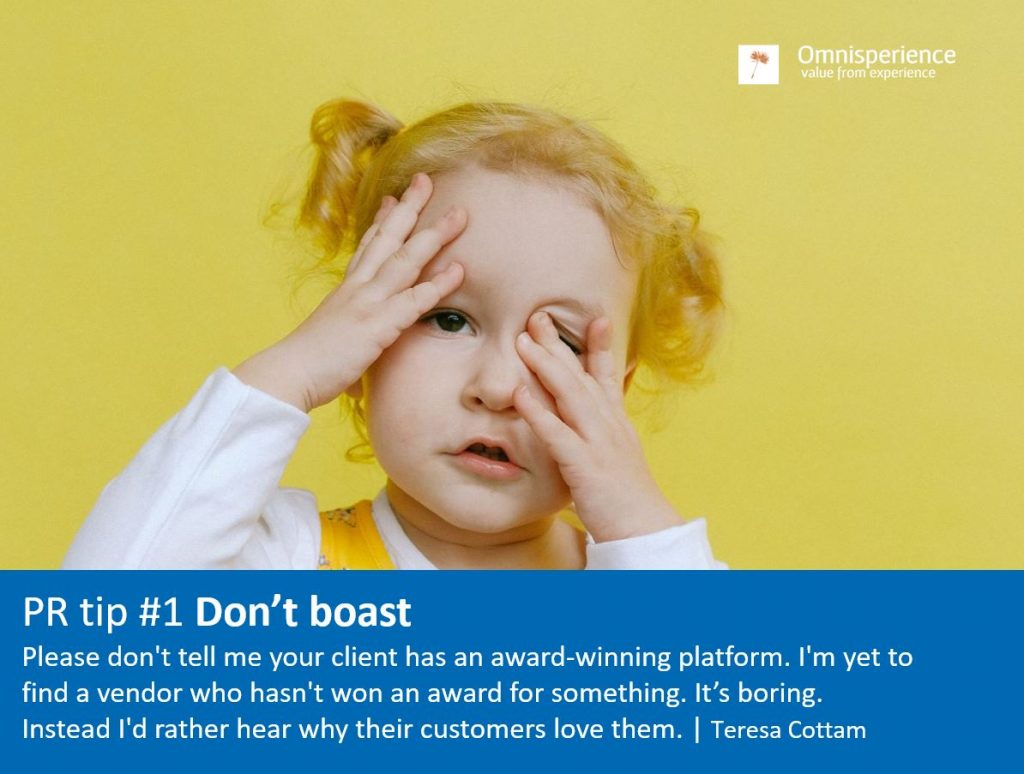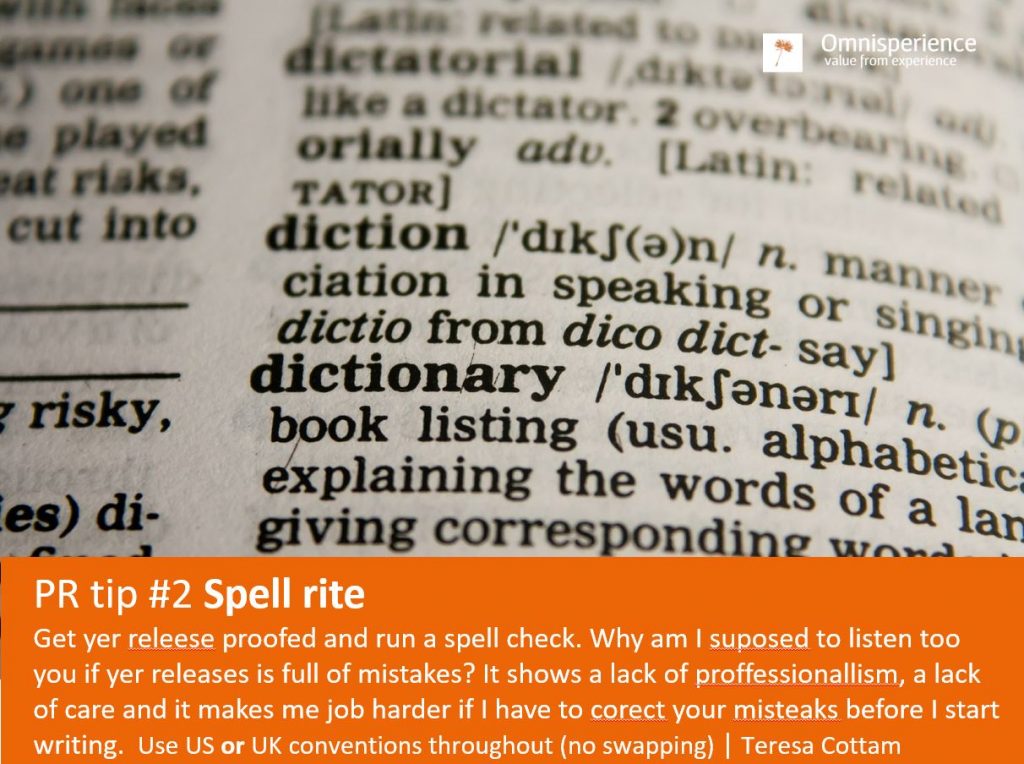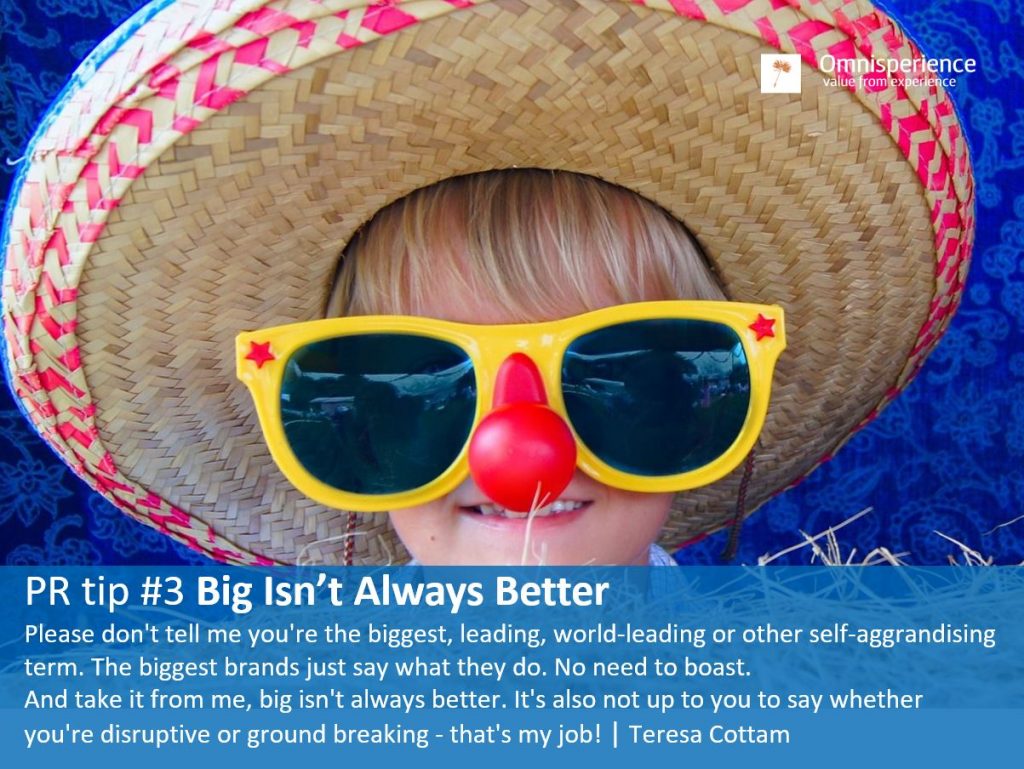From positioning a company as leading with no proof to being rude and dismissive, what are some of the biggest PR no-nos when working with analysts? We spoke to Teresa Cottam, a highly experienced telecoms analyst at Omnisperience and she reflects on her own experience to provide an informative and at times cringeworthy (when considering some things that PRs have done) must-read interview.
Tell us a little bit about yourself
My name is Teresa Cottam and I am a telecoms industry analyst that specialises in the areas of monetisation and customer experience. I am the Chief Analyst of independent analysts Omnisperience, and previously worked at Analysys Mason, Chorleywood Consulting (which was bought by Informa) and Ovum. I am a judge for the GSMA’s GloMo Awards and for the World Communication Awards.

Name three top ways industry analysts help to get a company in front of their targets?
Ah here’s the first mistake that ARs make – they concentrate on the obvious. So the most obvious method is that we feature them in our reports or articles. But this ignores the fact that much of the buying process is informal.
An exec working in a telco will often ask me off the record – do you know anyone who does X? what is company Y really like in your opinion? Etc. It is during these off-the-record conversations that the real value of AR pays off. You have worked to keep me up-to-date and ensure that your client is in the front of my mind so that I put them in the frame when asked that question. Usually vendors only measure share of analyst voice, which is just measuring the success of marketing (brand awareness).
If vendors want to increase sales opportunities then they need to understand who’s opinion is trusted and who’s accessible to their clients. Certain analyst firms will not even allow their analysts to have these informal conversations, so even if the analyst is good they’re not influencing sales.
How do you work with PRs?
I like to build long-term relationships with them. Some of my relationships with PRs go back 25 years and have followed me from firm to firm and have followed the PR from firm to firm. It’s a human relationship. Sometimes I need the PR to pull out the stops for me; but that means the next time they come to me and ask me to do a briefing at short notice with a client then I’m going to pay back the favour they’ve done me and say yes.
I understand their job and how they’re measured, and the best PRs understand mine. I think it’s important to have mutual respect, because we have different skillsets and roles. I don’t show favouritism towards the clients of PRs I know well (I’m not going to say they’re good if they’re not); but it does give them easier access to me, because I trust you.

What are the four biggest screw ups you have encountered from PRs?
- PRs who think they’re experts. You meet PRs who think it’s their job to “correct” your misconception of their client. Now let me be clear here. If I have got something factually wrong then it is absolutely your job to diplomatically explain that to me. But when I advise you that the latest widget is not that exciting, it’s not up to you to tell me I’m wrong. You are allowed to point out why it’s exciting but if I tell you I don’t agree then at that point you’re supposed to listen and ask why. There’s a level of arrogance amongst certain young PRs where they think their opinion counts. No matter how much expertise they’ve acquired, they are not paid to be the expert. Their job is to be the facilitator, the relationship builder and the marketer of ideas. If they want to be the expert they need to come over the fence and do my job.
- Being rude and aggressive. When I was head of research and publications at Chorleywood I reached out to six companies to set up interviews for a report I was writing. Five of them fell over themselves to sort it out. The sixth company I contacted was really rude and told me to go away. I sent a stinking email to their VP marketing and their CEO. I told them that much bigger firms were falling over themselves to feature in this report and if they didn’t want to be in it that was fine, but a polite ‘no’ would have sufficed. There was no cost to being in the report, just their time. Within half an hour I got a call from said VP who was apologetic and mortified. She had literally just been in a meeting with the board to discuss how they could get into our reports. (Oh the irony.) The rude person, she said, was a new and junior member of staff. How could she fix it? Being a fair person I put my ego to one side and told her what I needed from her. She sorted it all out efficiently. I have long rated this as one of the greatest acts of diplomacy I’ve ever seen. But the point is NEVER be rude or dismissive because you don’t know who you’re talking to or what influence they have.
- Failure to connect. Again this is very common with young PRs. Relationships are your currency. What you will build your career on. You never know when an analyst relationship is going to come in handy. But many junior PRs only think about NOW. Because you’re not useful to them at this immediate time they ignore you and fail to maintain the relationship. Old school PRs see every relationship as valuable and they maintain and tend to these relationships. When you haven’t spoken to me for two years and suddenly need a favour, you should know you’re going to be at the back of the queue. I met a new PR the other day and she immediately sent me a LinkedIn request and thanked me for the meeting. It made me smile because I realised she had banked me for future use. Good job, I thought to myself.
- Using analyst quotes/content without approval. I was asked to provide a quote for a service provider product launch by their PR. I crafted a memorable and positive quote for them, as a favour to the PR firm in question. Their client wanted to change part of my quote to make it more favourable to them. The senior PR rang me and asked what I thought. I told her I wasn’t prepared to change the quote because it changed the meaning and made it too partisan. She told me she quite understood and not to worry as they had plenty of time to sort things out because the press release wouldn’t go out for a few more days. Imagine how I felt when the next day the press release was issued with the amended quote in it. Lesson to be learnt: you cannot change an analyst quote EVER without checking first. Not one comma, word or typo. It’s not just unprofessional, it’s rude. The mid-level PR had steamed ahead and issued the release without checking with me or her boss first. I cannot stress how important it is to triple check that you have the correct permissions before you press send. The analyst community is a very small one and word gets around fast. Our business runs on trust and if you abuse my trust you’ll find that to be a career-limiting mistake.
What are the best collaborations you have done with PRs?
I’ve worked with some great PRs over the years. When we do a piece of thought leadership with a vendor, it’s important to have a PR you can work with. Their job is to take my thought leadership and amplify it for their client. So working with someone who can pull the PRable angle out of thought leadership and organise press briefings and just make the whole thing sing and dance…it’s a pleasure to work with someone like that.
Sometimes I have serious reservations about a vendor or feedback on their spokesperson. I will tell the PR off-record my feedback. The best PRs use that information and advice to guide their spokesperson and refine their approach. They’re not defensive about it but grateful to get honest feedback.
When they come back to you in 6-12 months with a much better pitch and a better trained CEO it makes me feel happy that I helped and that they did their job well. By the way, I’d much rather have a ‘rough’, untrained CEO who is honest and knowledgeable, than a pitch perfect CEO with nothing to say. Managing your client’s ego is a big part of the PR job and one I’m grateful for.

What could PRs do to make your job easier?
Give me the skinny. Give me a ring, run down your 6 clients and summarise what they have to say. By all means say ‘we thought this one was for you, but these are less relevant’. I may agree or not. If you over-curate who you expose me to, you may be missing opportunities. If I agree with you, then you just showed me you have good judgement and understand me. If you have one main client give me the skinny on that client – what they’re saying, this is what’s in the pipeline, this is their key angle this half.
Be realistic. As independent analysts (there’s more than just me) we don’t have as much time as analysts in big firms. Don’t waste my time and if your client isn’t our client then don’t expect us to travel to the other end of the country on our own dollar just to fill up your slots and make you look good.
Don’t quote other analyst firms at us. Just because Gartner thinks your client is hot, doesn’t mean I will.

What does a “perfect PR” look like to you?
When you write a press release please think about the person who has to use this to write a story from. If the press release really stinks (because your client won’t take advice), do the decent thing and write the real story in the email. Keep the story simple. What really matters? Back up assertions with data and examples. Make sure we can follow up the release easily.
The perfect PR is someone who’s good with people, organised and diplomatic. They recognise the importance of their analyst relationships and they’ll give me a ring intermittently to give me the skinny (see above). They also recognise that our industry runs like other relationships on a reciprocal basis. That includes helping me build a relationship with your client, and putting me in the frame when work comes along.
They understand the value of longevity in relationships and don’t burn a relationship just to please a current client. Half of your job is knowing how to control your client so that an individual within the client doesn’t ruin the relationship for the entire firm. I can’t emphasise enough to vendors that a good PR isn’t just one who says yes to you all the time. They counsel you, improve the way you present yourself, tell you when you’re wrong. Don’t let your ego get in the way of good advice – listen to what they’re advising you. The whole point of having an external PR and talking to analysts is to get you outside your echo chamber to test your ideas and messages.
Wow, what an interview...thanks to Teresa, this is definitely a useful starting point and also a refresher for all us PR and ARs out there on how to improve analyst relations.
The images above are from a series of 14 tips on better B2B PR - head to Teresa's site to see the rest:







